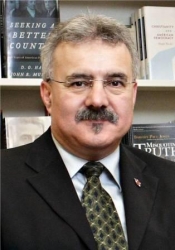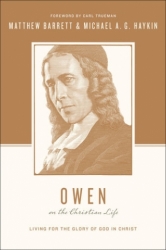Welcome to Books At a Glance! I’m Fred Zaspel, and Dr. Michael Haykin is with us again, today focusing on the magisterial Reformer himself, John Calvin.
Michael, first off, who are the “magisterial” Reformers? And why do we call them that?
Haykin:
The magisterial Reformers we know as individuals who believe that Reformation in Europe had to be accompanied by the power of the state. And they would have argued that the state officials, the various kings and nobility, etc. were responsible under God to ensure Reformation if the Church did not. So they basically were living within the confines or cocoon of Constantinism, the union of church and state that had taken place as a result of Constantine’s conversion to Christianity in the fourth century. That had prevailed throughout the Medieval period, and the Reformers agreed with their Roman Catholic opponents that Church and State belonged together. The Church was to enforce orthodoxy.
Various magisterial Reformers – obviously Luther is one, in Germany; Philip Melanchthon, also in Germany, 1497 – 1560; people like Huldrych Zwingli, 1484 – 1531, in Switzerland. His successor was Heinrich Bullinger 1504 – 1575. And then other German theologians like Martin Bucer, who would die in 1551 in Cambridge, England. And then, of course, Calvin. Viret, Farel, all of these men would be regarded as magisterial theologians.
Zaspel:
Why did Philipp Melancthon refer to Calvin as “the theologian”?
Haykin:
Even though there were a number of capable theologians, which I have just mentioned, people like Zwingli, Bullinger, Bucer, etc., and even though Melanchthon, for example, wrote a systematic theology, his Loci Communis, published in 1521 and later editions, none of them produced anything resembling a systematic theology on the scale of Calvin’s. Calvin did it so masterfully that Philip Melanchthon dubbed Calvin as “the theologian.” So, although reading these other writers is helpful, really, it’s Calvin who systematizes Reformation theology.
Zaspel:
What are the key elements of Calvin’s theology?
Haykin:
Well, I think the key elements can be found in his Institutes, which was first published in 1536, and would go through a variety of editions in both Latin and French. Calvin realized pretty quickly that he needed a French edition, and so he translated his Institutes into Latin and into French from Latin. The Institutes went through a variety of editions but uniting them, unifying them, were really two central thoughts.
One is that God is sovereign over all of creation. The sovereignty of God is something that Calvin shows us in his conversion. For instance, it was God who converted him. He doesn’t mention any human instruments. The sovereignty of God is seen in revealing himself to man, in his providential guiding of man, his work of regeneration, saving sinners. So, the sovereignty of God in all areas of life, not just in the area of soteriology.
Then, the glory of God. Calvin was deeply shaped in his thinking that we live for the glory of God. In some ways, Calvin’s great question is not the same as Luther’s. Luther’s is, “How can I find a gracious God?” Calvin’s is, “How can I live with this gracious God?” The danger of statements like that is that they are simplistic and they overly simplify. But if a statement like that can be made, Calvin’s interests revolve around, “How can I live for the glory of this God?”
Zaspel:
We’re talking to Dr. Michael Haykin, Professor of Church History at The Southern Baptist Theological Seminary and author of many books related to church history that you can check out here on our page. We hope you’ll join us next time as Dr. Haykin talks to us about Calvin and Reformation missions.
Editor’s Note: You’ll want to check out these church history related titles from Dr. Haykin.
Books by Michael Haykin
The Advent of Evangelicalism: Exploring Historical Continuities
Amazon (Paperback)
To the Ends of the Earth: Calvin’s Missional Vision and Legacy
The Revived Puritan: The Spirituality of George Whitefield (Classics of Reformed Spirituality)
Amazon (Paperback)
The Baptist Story: From English Sect to Global Movement
The Christian Lover: The Sweetness of Love and Marriage in the Letters of Believers
Pentecostal Outpourings: Revival and the Reformed Tradition
The Reformers and Puritans as Spiritual Mentors: Hope Is Kindled (Christian Mentor)
Patrick of Ireland: His Life and Impact (Biography)
Rediscovering the Church Fathers: Who They Were and How They Shaped the Church
Eight Women of Faith
Amazon (Paperback) (Kindle) (Audiobook) (Audio CD)
Soldiers of Christ
Amazon (Paperback)
Jonathan Edwards: The Holy Spirit in Revival (Emmaus)
Amazon (Paperback)
Defence of the Truth: Contending for the Faith Yesterday and Today
Amazon (Paperback)
Ardent Love for Jesus: English Baptists and the Experience of Revival in the Long Eighteenth Century
Amazon (Paperback)
Kiffin Knollys & Keach: Rediscovering English Baptist Heritage
Amazon (Paperback)
A Cloud of Witnesses: Calvinistic Baptists in the 18th Century
Amazon (Paperback)
Bitesize Biographies: George Whitefield
Amazon (Paperback)
Devoted to the Service of the Temple: Piety, Persecution, and Ministry in the Writings of Hercules Collins (Profiles in Reformed Spirituality)
Travel with Jonathan Edwards
Amazon (Paperback)
Joy Unspeakable and Full of Glory: The Piety of Samuel and Sarah Pearce (Classics of Reformed Spirituality)
Amazon (Paperback)
A Consuming Fire: The Piety of Alexander Whyte
Baptists and War: Essays on Baptists and Military Conflict, 1640s-1990s
Amazon (Paperback) (Hardcover) (Kindle)
A Heart for Missions: Memoir of Samuel Pearce
Amazon (Paperback)
A Sweet Flame: Piety in the Letters of Jonathan Edwards (Profiles in Reformed Spirituality)
Waiting on the Spirit of Promise: The Life and Theology of Suffering of Abraham Cheare (Monographs in Baptist History)
Amazon (Paperback) (Hardcover) (Kindle)
Christ Is All: The Piety of Horatius Bonar (Profiles in Reformed Spirituality)
The Armies of the Lamb: The Spirituality of Andrew Fuller (Classics of Reformed Spirituality)
Amazon (Paperback)
To Honour God: The Spirituality of Oliver Cromwell (Classics of Reformed Spirituality)
Amazon (Paperback)
An Orthodox Catechism
The Empire of the Holy Spirit
Amazon (Kindle)
“The First Counsellor of our Denomination”: Studies in the Life and Ministry of Abraham Booth
Amazon (Kindle)
Church History 101: The Highlights of Twenty Centuries
Amazon (Paperback) (Kindle) (Audiobook) (Audio CD)
Owen on the Christian Life: Living for the Glory of God in Christ
The British Particular Baptists, Vol. 1: 1638 – 1910
Amazon (Hardcover)
The British Particular Baptists Vol. II: 1638-1910
Amazon (Hardcover)

